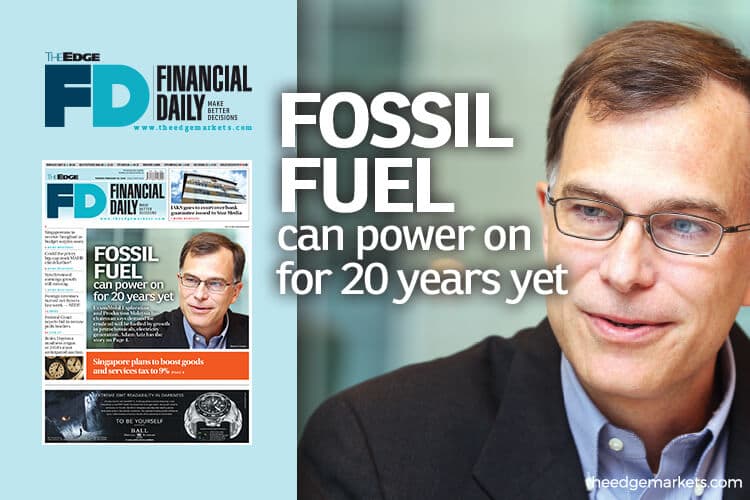
This article first appeared in The Edge Financial Daily on February 20, 2018
KUALA LUMPUR: Will fossil fuel not be in demand? Certainly not, at least in the next 20 years, according to ExxonMobil Exploration and Production Malaysia Inc president and chairman Edward E Graham.
In an exclusive interview, Graham told The Edge Financial Daily that demand for crude oil will be fuelled by growth in petrochemicals, and electricity generation, which will outgrow energy supply from renewables and hydrocarbons combined.
The oil major is projecting demand for oil and gas (O&G) to rise in tandem with the world population growth, despite the inclusion of renewables and alternative energy sources in the future.
“The projection is that [the] global population is going to grow from 7.4 billion presently to 9.2 billion in 2040,” he said, referring to the company’s report entitled “2018 Outlook for Energy: A View to 2040”.
“We’re going from potentially three billion to over five billion that are of middle-class stature in living conditions. With that is an explosion of additional trade globally, and the transportation of those goods and services. We don’t anticipate the demand for oil and gas to change [much],” Graham explained.
Accordingly, while technology for electric vehicles is becoming increasingly prevalent, the same cannot be said for heavy-duty or commercial vehicles like trucks and ships, Graham commented.
“Nobody is talking about how you’re going to run a quarter-mile-long ship with batteries. The technology is not there yet. There are a lot of growth opportunities here,” he said.
Petrochemicals the growth chemistry
Meanwhile, demand for petrochemicals is also expected to almost double by 2040, the report showed. This, said Graham, will help support growth amid expected flat demand for oil-based fuels and specialties chemicals.
On the other hand, energy demand for the Asia-Pacific is expected to grow by 25% between 2016 and 2040 — with a 60% rise in the Asia-Pacific, driven by China and India. In turn, coal and O&G are expected to continue contributing to the bulk of fuel consumption, despite supply from renewables projected to near double in the period.
“Renewables are kind of the fad right now. They produce low emissions, so it’s all good but it’s just not keeping pace with the [strong global] demand,” said Graham.
“We still see a lot of hydrocarbon in the mix. The challenge is that how this is going to work when we are trying to address climate challenges,” he said.
Opportunities in carbon emission
So while renewable energy is raking up market share percentage-wise, the higher usage of fossil fuels in absolute terms will still result in carbon emissions.
ExxonMobil, however, sees the thorny issue as the oil major’s business opportunity for future growth.
In fact, ExxonMobil is among companies racing to develop better carbon-capture technology, which Graham described as the “holy grail” in this segment.
“I just don’t know how we are going to get out of oil anytime soon,” said Graham. “Carbon capture has to be a part of that solution [to reduce carbon footprint]”.
Existing carbon-capture technology is “not that great” as yet, said Graham. “The process is still pretty expensive,” he said. “Rather than electric vehicles or renewables which we don’t have expertise in, we might be able to help through this mechanism.”
ExxonMobil’s carbon-capture technology, formulated with partner FuelCell Energy Inc, is en route for commercial testing, according to reports. The pilot testing had taken place in Alabama, south-east of the US.
The innovation part is the use of fuel cells — typically reactive to natural gas or hydrogen — that works with carbon dioxide to produce electricity while capturing and storing carbon waste at the same time.
That technology is, however, still years away from commercialisation, conceded Graham.
Reinvention for survival
Around the world, O&G companies are now preparing to reinvent themselves as energy companies, amid the hype around cleaner alternatives, and the expansion of electricity as the final form of energy to a wider array of consumers.
Oil majors, like Shell and Petroliam Nasional Bhd (Petronas), have openly talked about their involvement in renewables. Already, Norwegian firm Statoil has ventured into offshore windmill installations.
While the O&G remains the core business in the long run, ExxonMobil is also dipping its toes into renewables, but in a slightly different manner.
“A lot of renewables right now are really focused on electricity,” said Graham. ExxonMobil is doing things differently; it is seeking to produce biofuels from algae.
Again, the research is still years away from commercial production. But the vision, said Graham, is for the product to serve as an immediate low or zero emission substitute for current gasoline — in refineries, power plant and a consumer’s vehicle engine.
“We think growing biofuels using algae could be more competitive than corn, or palm oil that uses up water and land that will be needed to support the human population,” Graham. The algae can already produce the end product, and ExxonMobil is at the stage of engineering the algae to produce at a level that is economically viable.
“[The] energy industry is huge,” said Graham. “We have a huge challenge ahead of us to deliver what the world wants. Every opportunity and every technology count.”